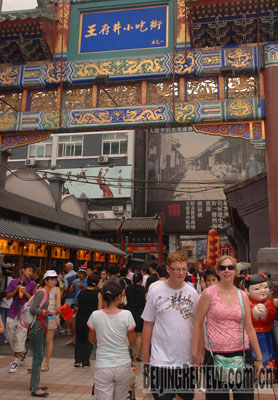|

MORE FOREIGN FACES: Beijing Olympics help to attract more overseas tourists to the capital city
The general public has been concerned about the negative effect on economic growth ever since the municipal government started moving heavy industries out of the capital to honor its commitment to stage a "green Olympics." The Capital Iron and Steel (Group) Co., a major polluter as well as a large contributor to Beijing's economic growth, started relocating its production facilities from the city's western outskirts in October 2005. The municipal government also decided that Beijing would no longer develop heavy industry according to its medium and long-term economic plans.
Post-Olympic slowdowns occurred in eight of the last 11 Olympic host countries because of a sharp drop in infrastructure investment and tourist consumption. That underlies concerns that this post-Olympic scenario could repeat itself in Beijing.
But Lu said Beijing has foreseen that possibility and made systematic arrangements and worked out measures to guarantee the capital's sustainable, rapid and sound economic growth in the near term. He pointed out that Beijing has maintained fast and steady growth in the past few years, largely because "the city is entering a high-growth phase," although the Olympic factor gave it an important push. Beijing will continue to introduce a large number of projects to implement its 11th Five-Year Plan from 2006 to 2010, involving transport facilities, energy and resources, water supply, eco-environment protection, education and cultural services.
From within
Beijing is a developing city, drawing impetus from within itself, from its infrastructure upgrading demands and industrial structure. It is undergoing the process of urbanization, internationalization and modernization, with its per-capita GDP rising to $10,000 or even higher from the current $7,000, Lu said.
"The experiences of other countries tell us that cities in this phase will always see an upward trend and abundant vitality in their economies," Lu said.
The Beijing Olympic Games have encouraged more citizens to take an interest in the sports and recreation industry, Chen said. He believes related industries, including tourism, sports, recreation, telecommunications and financial service sectors, will continue to develop and prop up the city's economic growth.
China has more than 20,000 businesses in fitness and recreation services, athletic competition or performance and sports technique training. The sports industry has already absorbed 200 billion yuan ($29.4 billion) in total investments, with annual turnover exceeding 60 billion yuan ($8.8 billion), Chen said. The sports and recreation industry in Beijing would maintain double-digit growth after the Olympic and Paralympic flames have been extinguished, Chen added.
Chen is also optimistic about the real estate industry over the next few years.
"The capital's real estate industry has developed along a healthy route with limited bubbles in the past seven years of Olympic preparations, although from 2005 to 2007, housing prices skyrocketed in the city," Chen said. He also said there would be slight and brief downward adjustments after the sports events, but the market would remain promising.
| 